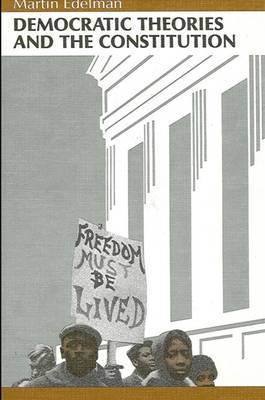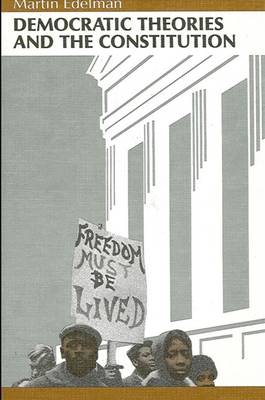
Door een staking bij bpost kan je online bestelling op dit moment iets langer onderweg zijn dan voorzien. Dringend iets nodig? Onze winkels ontvangen jou met open armen!
- Afhalen na 1 uur in een winkel met voorraad
- Gratis thuislevering in België vanaf € 30
- Ruim aanbod met 7 miljoen producten
Door een staking bij bpost kan je online bestelling op dit moment iets langer onderweg zijn dan voorzien. Dringend iets nodig? Onze winkels ontvangen jou met open armen!
- Afhalen na 1 uur in een winkel met voorraad
- Gratis thuislevering in België vanaf € 30
- Ruim aanbod met 7 miljoen producten
Zoeken
Omschrijving
Although the government of the United States is traditionally viewed as a democracy, there is considerable disagreement about what democracy means and implies. In a comprehensive study Professor Edelman examines the three democratic paradigms most prevalent in America today: natural rights, contract, and competition. Theories based on these paradigms lead to different ideas of democracy, each of which yields variant interpretations of the Constitution. This close relationship between democratic theories and constitutional interpretations is analyzed in an extensive historical introduction, which focuses on some of the major thinkers in American history.
Edelman's discussion shows that neither the Constitution nor the development of American political thought can serve as an authoritative basis for any one theory of democracy. Instead of a particular theory, the historical constant was an appeal to reason inherent in our basic charter. In his methodological section, Edelman argues that we must use reason to clarify the latent values inherent in the differing concepts of democracy and the consequences that flow from them. He analyzes judicial ideas in the light of three concepts deemed central to any democratic theory--citizenship, political participation, and political freedom--and concludes with a balanced account of contemporary democratic theories, the constitutional theories related to them, and a critique of both.
Edelman's discussion shows that neither the Constitution nor the development of American political thought can serve as an authoritative basis for any one theory of democracy. Instead of a particular theory, the historical constant was an appeal to reason inherent in our basic charter. In his methodological section, Edelman argues that we must use reason to clarify the latent values inherent in the differing concepts of democracy and the consequences that flow from them. He analyzes judicial ideas in the light of three concepts deemed central to any democratic theory--citizenship, political participation, and political freedom--and concludes with a balanced account of contemporary democratic theories, the constitutional theories related to them, and a critique of both.
Specificaties
Betrokkenen
- Auteur(s):
- Uitgeverij:
Inhoud
- Aantal bladzijden:
- 412
- Taal:
- Engels
- Reeks:
Eigenschappen
- Productcode (EAN):
- 9780873958738
- Verschijningsdatum:
- 30/06/1985
- Uitvoering:
- Paperback
- Formaat:
- Trade paperback (VS)
- Afmetingen:
- 152 mm x 229 mm
- Gewicht:
- 562 g

Alleen bij Standaard Boekhandel
+ 115 punten op je klantenkaart van Standaard Boekhandel
Beoordelingen
We publiceren alleen reviews die voldoen aan de voorwaarden voor reviews. Bekijk onze voorwaarden voor reviews.











